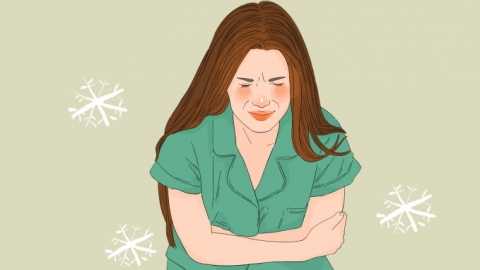What causes menstrual pain at the age of 18?
Dysmenorrhea at age 18 may be caused by excessive prostaglandin secretion, poor lifestyle habits, primary dysmenorrhea, endometriosis, or adenomyosis. Symptoms can be improved through lifestyle adjustments, medication, and symptomatic treatment. If menstrual pain is severe or accompanied by abnormal menstrual flow or prolonged periods, prompt medical attention is necessary.
1. Excessive prostaglandin secretion: During menstruation, the endometrium releases large amounts of prostaglandins, which stimulate strong uterine contractions and cause dysmenorrhea, often accompanied by a sensation of heaviness or pain in the lower abdomen. It is recommended to stay warm during menstruation, apply a hot water bottle to the abdomen, and reduce intake of raw or cold foods.
2. Poor lifestyle habits: Staying up late, engaging in intense exercise, or consuming spicy and stimulating foods before menstruation can increase physical stress and trigger dysmenorrhea, often accompanied by fatigue and lower back soreness. It is advised to maintain regular sleep patterns, avoid strenuous activities during menstruation, and eat mild, easily digestible foods.

3. Primary dysmenorrhea: This occurs without organic pathology and is often due to abnormal uterine position or cervical stenosis causing poor menstrual blood discharge, leading to pain typically concentrated from 1–2 days before menstruation through the second day of the period. Under medical guidance, medications such as ibuprofen sustained-release capsules, naproxen tablets, or acetaminophen tablets may be used to relieve symptoms.
4. Endometriosis: This condition involves endometrial tissue growing outside the uterus. During menstruation, bleeding from this ectopic tissue irritates surrounding structures, causing dysmenorrhea along with painful intercourse and increased menstrual flow. Under medical supervision, medications such as drospirenone ethinyl estradiol tablets, dienogest tablets, or indomethacin enteric-coated tablets may help alleviate symptoms.
5. Adenomyosis: This occurs when endometrial tissue invades the muscular wall of the uterus. During menstruation, bleeding within the muscle layer causes uterine enlargement and abnormal contractions, resulting in dysmenorrhea that progressively worsens over time. Follow medical advice to use medications such as gestrinone capsules, danazol capsules, or ibuprofen capsules to manage symptoms.
Maintain a regular sleep schedule and avoid staying up late. Keep the abdomen warm during menstruation, choose mild and non-irritating foods, and engage in light walking to promote circulation and help relieve menstrual discomfort.




